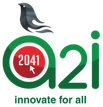Skills For Employment Lab
Skills For Employment Lab
Form the right linkages in the education sector to meet the goals of becoming a strong middle-income country based on local and international market demand.
Skills for Employment
Shymol Kumar has a family of 8 members and he is the eldest son of his family. He had to take responsibility for his family since his father died at an early age. As a result, he discontinued his study in class 8. To earn his family’s livelihood, he started farming. He was hardly making both ends meet. His siblings also had to give up study because of financial instability. In July 2016, Shymol got to know through their local Union Digital Center (UDC) about a two-month duration training program on knit machine operation. After successful completion of the training, Shyamol received a job placement assurance by BGMEA. He confirmed his admission in September- October session after discussing with his family. He received first-hand training on the suitor, polo shirt, t-shirt and jersey knitting. He passed the training successfully and on 1 November he joined as an operator in Niagara Textile Limited, located in Gazipur. His monthly salary is 10,000 taka with an opportunity of earning more through overtime. His income is more than that of the other operators and he can work more efficiently and effectively, thanks to the training program. He can now afford the smile of his family with his stable income. Shymol is quite optimistic that other unemployed youth would also follow his trail and ensure a better living for their families and themselves. Training of these kinds could change the macro-economic condition of the overall country, increasing the living standard of the impoverished sections of this country. Beneficiary Shymol expressed his gratitude this way- “Knit machine operation program has changed me and my family’s life. I am better off now. I can now send money to my mother every month. I am sincerely indebted to a2i” advanced digital patient follow up system for those underprivileged people.

Within 6 months of operation, the project developed 08 Upazila level CDISB under Upazilla Disabled People Development Councils (UDPDC) with advanced specialized services. This project has been developed for the purpose of social and economic of disable people in the rural areas of Bangladesh, as well as access to information with Community Digital Information and Service Booth (CDISB). All the beneficiaries of the project are physically impaired and socially discriminated. This project will be helpful to ensure access to information from various services providing organization, employment and income generation, training, capacity & skill development for the people with disabilities and it will ensure their development in a sustainable manner.
Current education, training and employment scenario in Bangladesh
The education sector is often disconnected from the market. The skills developed by the former are often not demanded by the latter causing unemployment and underemployment of the so-called ‘educated’ and ‘trained’. At the same time, the former does not or is not able to produce skills that the latter demands leading to jobs in the market that the local labor force cannot fulfill. Such disconnection leads to wastage of national resources, the frustration of the graduates at different educational tiers, and delayed achievement of national economic goals and SDGs.
With a total population of around 166+ million and a labor force of about 82 million, Bangladesh has a youth unemployment rate of 11% and an underemployment rate of 19% which are steadily moving in an upward direction, according to a 2015 World Bank report. 2 million are joining the job market every year whereas the government trains 1.3 million every year. However, the problem is that most of this training is inadequate, not demand-based, and does not include the new labor market entrants.
a2i’s Holistic Strategy
a2i is the key driver of the government’s public service innovation agenda. Aligned with the importance of skills development in the context of Bangladesh and the high priority accorded to this issue by Honorable Prime Minister, a2i is working with a whole-of-government approach applying behavior change methodologies and leveraging the rapid expansion of technologies to create an enabling environment for the development of 21st-century skills in Bangladesh.
a2i is spearheading efforts to 1) Increase remittance per capita, 2) Ensure decent work for everyone. a2i has developed a strategic framework on “Skills for Employment” identifying 4 priority areas:
Market Analysis, Forecasting and Prioritization: Labour force trained by the government training agencies for local or foreign market struggle due to inappropriate knowledge and skills. On the other hand, massive infrastructure projects in the country are in the process of creating huge employment opportunities for which labor skills development is not happening based on demand. To analyze the demand and prioritize skills development, a2i and Bangladesh Economic Zones Authority (BEZA) are jointly conducting a study for the local market, whereas the Ministry of Expatriates’ Welfare and Overseas Employment is doing a study for the international markets.
Market-driven skills development: a2i has partnered with various organizations to create the necessary linkages between skills development agencies and job providers to pave the way for the workers to get gainful employment in different industries. Some of the initiatives are as follows:


